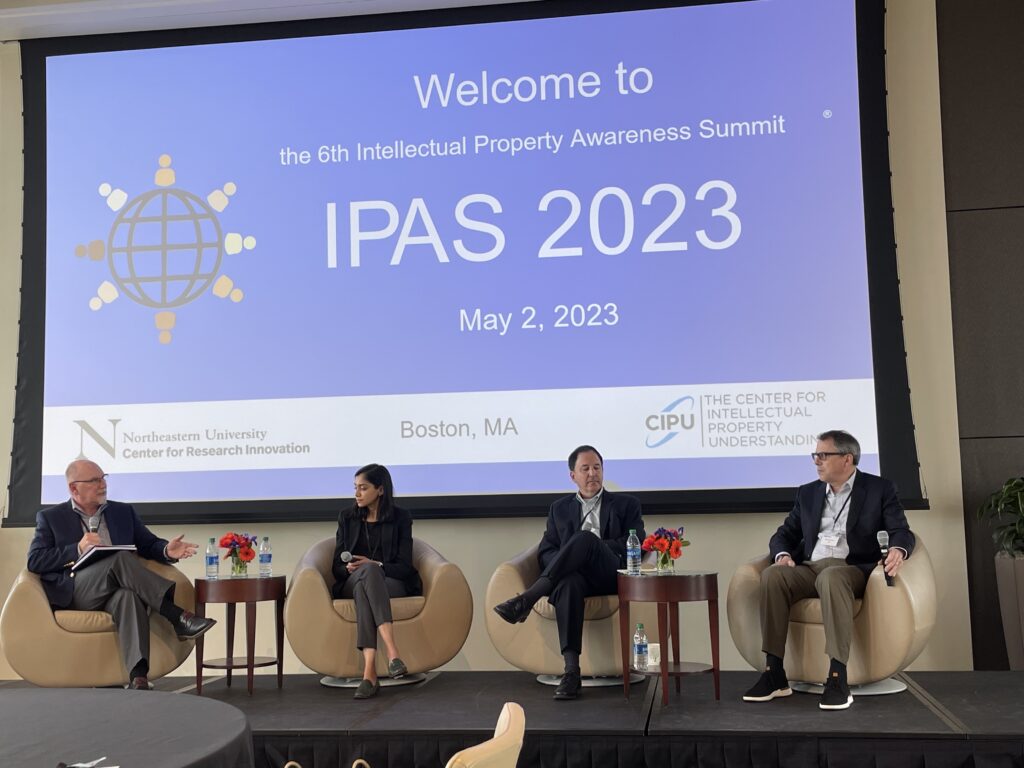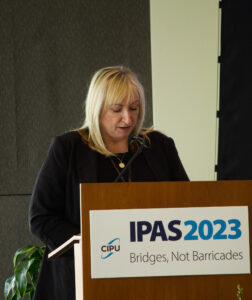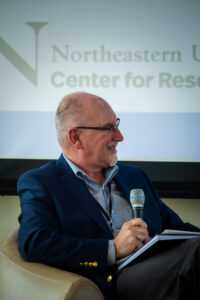
Unlocking the Power of Ideas through Bridges, Not Barricades: Insights from the Intellectual Property Awareness Summit 2023
Imagine a world stripped of Intellectual Property (IP) rights, where groundbreaking innovations and artistic expressions are trampled upon, and businesses are left rudderless, bereft of their ideas’ profitable rewards. This dystopian vision is thankfully not a reality since IP rights exist to safeguard the fruits of the mind, stimulating creativity, innovation, and economic progress.
With an unwavering commitment to the importance of IP rights, the Center for Intellectual Property Understanding (CIPU) and Northeastern University’s Center for Research Innovation (CRI) hosted the Intellectual Property Awareness Summit® (IPAS 2023) on May 2nd in Boston. The summit’s theme, ‘Bridges, Not Barricades,’ encapsulated the gathering’s mission to propagate IP rights’ prominence within society.
 “The CRI is making a profound impact on the community of creators, inventors, educators, and lawyers through its transformative initiatives, such as the Intellectual Property Awareness Summit (IPAS).” From the words of Jennifer Boyle-Lynch, Executive Director of CRI on the recent gathering of distinguished leaders in intellectual property, exudes an air of enthusiasm and anticipation for the potential impact of these discussions. It underscores the fundamental role that intellectual property plays in empowering individuals and driving economic growth. As the stewards of Northeastern’s patent portfolio, CRI holds a tremendous opportunity to shape the course of innovation and create a legacy that endures beyond the current generation.
“The CRI is making a profound impact on the community of creators, inventors, educators, and lawyers through its transformative initiatives, such as the Intellectual Property Awareness Summit (IPAS).” From the words of Jennifer Boyle-Lynch, Executive Director of CRI on the recent gathering of distinguished leaders in intellectual property, exudes an air of enthusiasm and anticipation for the potential impact of these discussions. It underscores the fundamental role that intellectual property plays in empowering individuals and driving economic growth. As the stewards of Northeastern’s patent portfolio, CRI holds a tremendous opportunity to shape the course of innovation and create a legacy that endures beyond the current generation.
Bruce Berman, Chairman of the Center for IP Understanding, recognizes the significance of organizing the Intellectual Property Awareness Summit (IPAS) in the realm of intellectual property. “The paramount objective is to foster a culture of intellectual property education among the community of IP owners, creators, educators, legal practitioners, organizations, and investors, and to impart that knowledge to the general public. By creating greater awareness of IP’s pivotal role in innovation, commerce, and social progress, IPAS can help bridge the knowledge gap and enhance public appreciation for this critical field.”
Distinguished luminaries from diverse backgrounds, including IP owners, creators, educators, legal practitioners, organizations, and investors from all corners of the world, congregated at the summit, galvanized by a shared goal to unlock the full potential of IP, and endorse its education. They exchanged insights and strategies for intensifying IP awareness and nurturing innovation, while the summit provided an exceptional platform for global discussions and networking.
Several panelists’ perspectives stood out and left a lasting impression on the audience. The discussions revolved around the essential role of balancing IP protection and accessibility, with the experts highlighting the necessity of collaboration and cooperation among stakeholders. Furthermore, the panelists stressed the need to educate society about the value and significance of IP, particularly for small businesses and individual creators. The experts also acknowledged the importance of emerging technologies such as blockchain and AI, which could revolutionize managing and safeguarding IP rights in the digital era.
 One such panelist who delivered an intriguing and thought-provoking address was Myron Kassaraba, the Director of Commercialization at CRI. Kassaraba eloquently emphasized “the significant role of IP in enabling the development of products and services and generating research in the field of AI.” He expounded on the transformational shift from patent licensing to core development, spearheaded by the implementation of rigorous research and development practices. His thought-provoking insights revealed the positive, long-lasting impact of this paradigm shift on various professional fields, leaving the audience spellbound.
One such panelist who delivered an intriguing and thought-provoking address was Myron Kassaraba, the Director of Commercialization at CRI. Kassaraba eloquently emphasized “the significant role of IP in enabling the development of products and services and generating research in the field of AI.” He expounded on the transformational shift from patent licensing to core development, spearheaded by the implementation of rigorous research and development practices. His thought-provoking insights revealed the positive, long-lasting impact of this paradigm shift on various professional fields, leaving the audience spellbound.
Adding to that, Bill LaFontaine, the General Manager of Intellectual Property Licensing at IBM, succinctly weighed the pros and cons of using AI tools. He acknowledged that while these tools may increase efficiency and save time and resources, they may also entail the calculated risk of overlooking certain critical information.
Nimra Taqi, the Director of Licensing at Mass General Brigham, illuminated the intricate process of shifting from licensing patents to actual core development. She revealed her intriguing perspective on the fruitful journey of this transformation, while also acknowledging the ethical concerns surrounding the usage of Generative AI on Healthcare.
Keith Kupferschmid, the CEO of the Copyright Alliance, articulated how Generative AI companies make use of copyrighted works, emphasizing the importance of respecting the creator’s rights and preserving the creator’s copyrights integrity. His eloquent discourse effectively captured the audience’s attention, fostering a deeper understanding of the complex interplay between Generative AI and copyrighted works.
The gathering featured a range of panels and discussions that covered critical aspects of IP, including its role in shaping global competitiveness and economic progress. Another panel, titled “The Innovation Race: IP and U.S. global leadership, China and beyond,” was a riveting affair, featuring celebrated speakers like Adam Mossoff, Andrei Iancu, Kendalle Burlin O’Connell, and Patrick Kilbride. Amidst the charged atmosphere, Andrei Iancu delivered a passionate call to action, emphasizing the need for the United States to assert its dominance in cutting-edge technologies such as AI, Quantum Computing, and Telecommunications. Channeling the spirit of the Cold War-era Space Race, Iancu urged the restoration of the right to injunction and the amendment of Section 101 in the constitution to safeguard patents from infringement.
Another panel of particular interest was on “Educating future leaders about IP – What they need to know,” featuring a formidable cohort of speakers, including Stephanie Couch, Daryl Lim, James Conley, Tiffany Norwood, and Rafael Cardona. The panel expounded on the role of Business, Engineering, and Law schools in imparting IP education, while also tackling the pivotal question of how much IP education is adequate. Notably, Tiffany Norwood, a distinguished inventor, and Cornell University’s Entrepreneur of the Year, advocated for the integration of IP education into the curriculum to kindle creativity and innovation.
The event proved to be a riveting event that stimulated a thought-provoking conversation about the critical role of IP in fostering success and the dire need for increased representation of women in leadership. The panel discussion on entrepreneurship and inclusion featured an esteemed group of speakers, including Arlyne Simon, Madeleine Key, Muriel Medard, Maysa Razavi, and James Howard, who offered insightful perspectives on how to make inventors more inclusive. The panel highlighted how women in engineering receiving patents can help them gain the respect they deserve and proposed practical solutions to close the gender gap in patent ownership. Simon advocated for creating a more gender-neutral community of IP owners, creators, educators, lawyers, organizations, and investors, emphasizing the need for gender equality in the field of engineering.
In a world where intellectual property rights are often underappreciated, the Intellectual Property Awareness Summit® served as a beacon of hope for those committed to safeguarding the fruits of the mind. With a resolute focus on promoting the prominence of IP rights within society, distinguished luminaries from various backgrounds gathered in Boston to exchange insights and strategies for nurturing innovation and intensifying IP awareness. From the essential role of balancing IP protection and accessibility to the emerging technologies that could revolutionize IP rights management, the panel discussions were nothing short of captivating. IPAS 2023 proved to be an insightful event that reinforced the importance of championing imagination and safeguarding human creativity from the perils of automation.
Written by Yash Wadhwa
